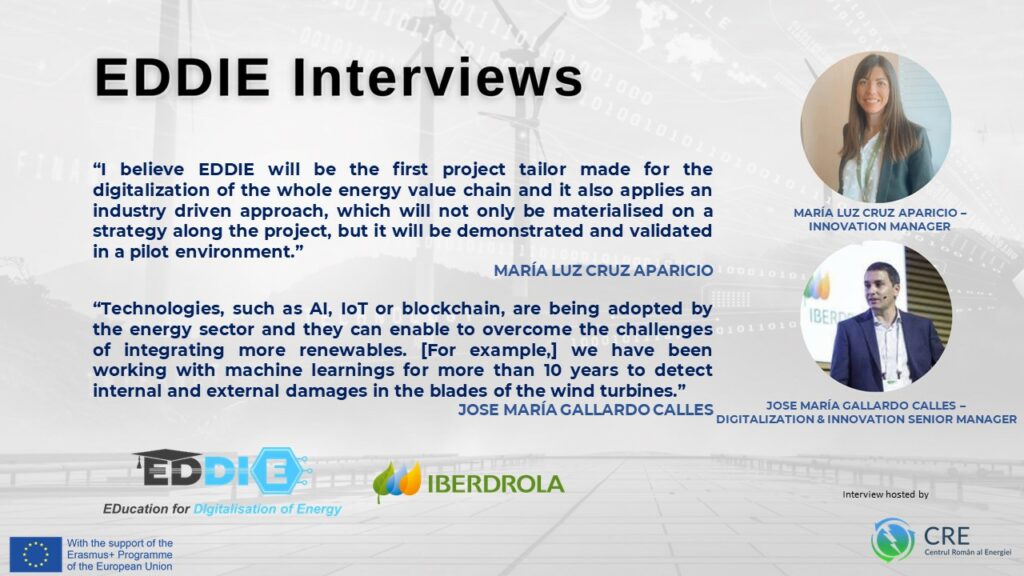7th guest – Partner IBERDROLA
María Luz Cruz Aparicio – Innovation Manager, IBERDROLA
Jose María Gallardo Calles – Digitalization & Innovation Senior Manager, IBERDROLA

Ms. Cruz Aparicio, through which specific approaches, do you think, EDDIE is an innovative project?
The need for effective education and training in the energy sector is a fact. There are a series of important projects and initiatives ongoing, but the most of these activities are focused on few technologies and consider digitalization an ingredient of the energy transition process, but limited attention has been paid on the challenges, opportunities, skill gaps and necessary actions concerning the digitalization of the energy sector.
In addition, most of those activities are focusing only on higher education and do not address lower levels or vocational education.
In this sense, I believe EDDIE will be the first project tailor made for the digitalization of the whole energy value chain and it also applies an industry driven approach, which will not only be materialised on a strategy along the project, but it will be demonstrated and validated in a pilot environment.
In addition, we will include both soft and green skills, all educational levels will be addressed, and we will look for synergies and collaboration with other blueprints and initiatives in Europe.
Mr. Gallardo Calles, as an industrial engineer with strong knowledge on IT areas, how do you see the multi-disciplinary approach in education/training as a solution in the digitalization of the energy sector?
In my opinion, multi-disciplinary approach in education and training is key for the current jobs required in most of the companies, especially for the energy sector, where an engineer degree together with digital skills are the perfect fit for maximizing the value creation in any digital project for the company.
A good example is the Iberdrola Renewables Control Centres. The design and the needs of these control centres require a multi-disciplinary team of electrical engineers with strong knowledge in IoT technology and SCADA systems as well.
The engineers must fulfil the requirements and they had to fully understand how the electrical facilities (substations, wind and PVs plants, etc.) work in order to implement properly the remote supervision and control through the IoT and SCADA platform. As a result, around 11.000 wind turbines, worldwide, from different manufactures are remotely operated in real time by the IBERDROLA team in a more efficient and intuitive way.
Additionally, our company realized the importance of the digitalisation and created last year the Digital Mentoring Program for its employees, so mentors and mentees can develop internally their digital skills.
Ms. Cruz Aparicio, from your point of view, how the sustainability of the project’ outcomes can be ensured?
This is one of the main goals of the project – to achieve the maximum efficiency and sustainability of the results. For this reason, it will be critical the creation of an e-platform updated with educational tools, and training courses that can be used by all members. The platform can also work as a marketplace where digital training providers can advertise their courses and industrial companies can post their job vacancies,
The development of a pilot will also be crucial to demonstrate the scalability, replicability and the sustainability of the action plan.
From another point of view, the dissemination actions will allow to have a large number of stakeholders interested in the project, which will be able to contribute with their vision.
Finally, the exploitation of the results will contribute and will create a greater impact both on project participants and the consortium partners at the end of the project lifespan.
Mr. Gallardo Calles, based on your extensive background in R&D projects, can you explain how digitization/digitalization is used in renewable energy projects?
Technologies, such as AI, IoT or blockchain, are being adopted by the energy sector and they can enable to overcome the challenges of integrating more renewables.
We are currently applying machine learning mechanisms & self-learning algorithms and participating in decision making that are resulting in a reduced corrective maintenance time and improved reliability of the renewable energy generation.
The applications are diverse.
We have been working with machine learnings for more than 10 years to detect internal and external damages in the blades of the wind turbines. It allows to prepare a better planning for the annual maintenance campaigns.
Another example is the use of predicted technology to evaluate the health of the wind turbines. By combining data sensors of the wind turbines with the state-of-art machine learning, we can assess turbine performance and health and predict future problems.
One last example targets blockchain and here at Iberdrola we have a deep experience in this technology by being part of several national and international groups like the Energy Web Foundation, the Spanish Alastria Consortium and the Eurelectric Blockchain Platform. Additionally, we have developed pilots and projects in different Iberdrola business units to facilitate the renewables energy integration like tracking the renewable origin of energy with the participation of the Energy Web Foundation.
What are you doing when you are not working?
Ms. Cruz Aparicio: I think I’m pretty conventional, as I grew up in a small town surrounded by nature and therefore, I love being outside and walking. I also like socializing with friends and family; relaxing by doing Pilates and I like watching movies (particularly thrillers) and reading.
Mr. Gallardo Calles:I need to take time off from work to do regular exercise and I make the most of my time with intensive sport like fitboxing, which is very fun by acting as a functional training with a combination of music, muay thai and kickboxing. I also spend my spare time with family, by travelling, or doing different activities at home like boardgames, but also outdoor sports like cycling and fishing.




